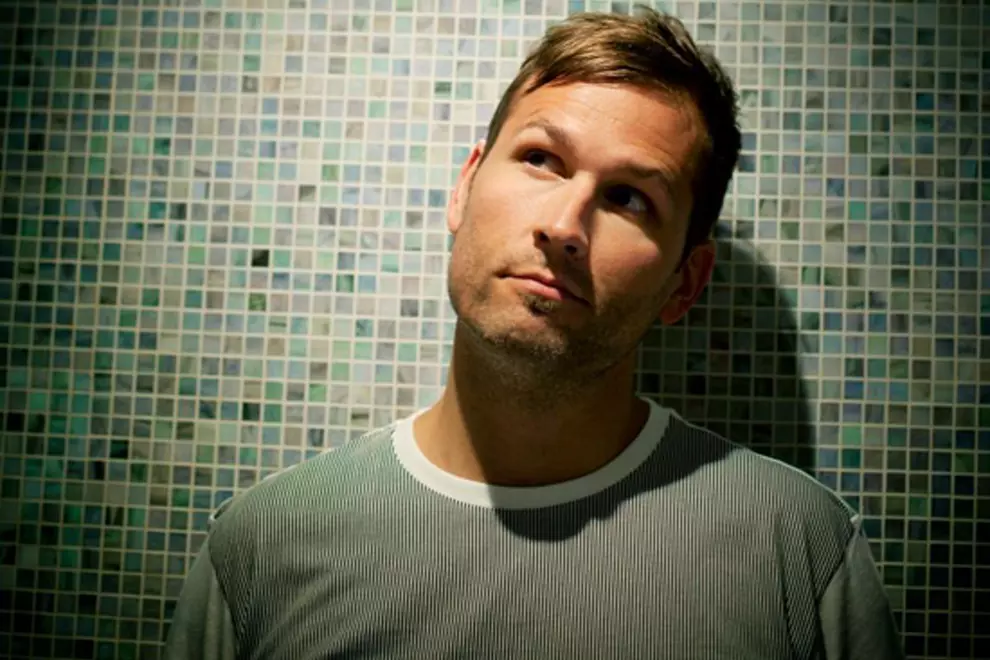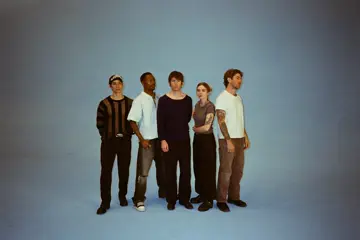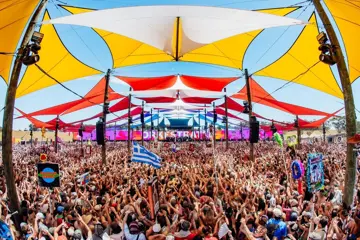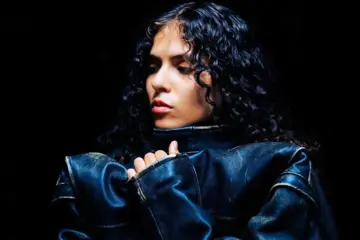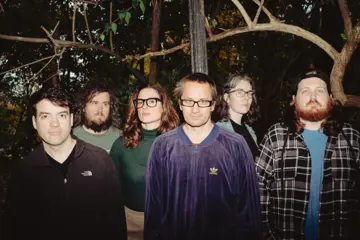At the start of the 2000s Kaskade (AKA Ryan Raddon) was a wandering Chicago kid advancing the West Coast's underground house movement. Today he's leading a global EDM revolution, having collaborated with Deadmau5, Tiësto and Skrillex. This month the super-DJ, who last hit Stereosonic 2011, will join Big Day Out's Boiler Room bill, albeit for only two dates – Sydney and the Gold Coast. Raddon won't significantly change tack for a rock-oriented festival, he says. "I approach it a little differently, I guess – not too differently, just 'cause to me festivals are festivals are festivals."
The onetime club DJ famously played 2012's Coachella at the same time as Radiohead. He did worry about the scheduling. But in the end Raddon's set was "massive" (Fuse dubbed it an "anti-Radiohead dance party"). "I think they coulda had a tent three or four times the size that they had it and still wouldn't have held the people who were circling around trying to get in. It was freakin' chaos." He was grateful the main stage had a popular band.
During BDO Raddon is likely to be "kicking it" with buddy Brandon Flowers, The Killers' frontman. "If I can convince him, maybe he'll come by my hotel room afterwards and we can make some music." The pair have something in common apart from music, both being affiliated with The Church of Jesus Christ of Latter-day Saints. In contrast to Flowers, Raddon, also married with kids, rarely discusses his faith – yet his music is typically positive.
Raddon, exposed to house in his native Chi-town, attended Utah's Mormon Brigham Young University, Twilight creator Stephenie Meyer a graduate, in the late '80s. According to Wikipedia, he hosted parties in his dorm – surely breaking all the rules. (Raddon eventually switched colleges.) "Wikipedia is very hmmm," the DJ says wryly. "I didn't throw any parties while I was living in the dorms, but I definitely had my share of parties at my apartment – when I moved out of the dorms. They were fun – and rowdy (laughs). I actually remember one party that was on the second floor and, we didn't break through to the first floor, but we did break the ceiling. We had so many people up that it broke the beads. When we realised the floor was slumping, we got everyone out pretty quickly. But, yeah, I had to pay to fix the ceiling of the apartment underneath me."
Don't miss a beat with our FREE daily newsletter
Raddon ran a Salt Lake City record store. Encouraged by his wife, he'd relocate to San Francisco, landing an A&R role at OM Records. In 2001 Raddon aired his first key single, What I Say, via OM. An album, It's You, It's Me, surfaced two years on. The neo-soulster Maxwell was an early fan. Raddon's seventh – and most recent – foray, the conceptual double-album Fire & Ice, home to his anthem Lick It with Skrillex, dropped at the end of 2011. It's now up for a Grammy ("Best Dance/Electronica Album"). Since then, Raddon, a prolific remixer, has tweaked Usher's Climax.
Raddon has long slunk away from deep house into tougher electro and prog – though he sees this as evolution, not reinvention. Regardless, Raddon is still about the song. He loves vocals, Skylar Grey, co-writer of Eminem's Love The Way You Lie with Rihanna, gracing his hit Room For Happiness. Raddon has just issued the single No One Knows Who We Are with Russia's Swanky Tunes and Canadian electro-popster Lights. There will be another LP this year. "I'm working on it. I'm not quite finished yet. [But] I can see the light at the end of the tunnel, so I hope to have it out by May, June, July – hopefully!"
Raddon is among the biggest beneficiaries of the US EDM boom, last year completing an epic North American headlining 'concert'-style tour. Any predictions for the scene? "I think in 2013 we are in for more of the same. I really think the growth is gonna continue. This is kinda just the beginning." Raddon envisages those who've newly embraced electronica will properly explore it. "It's cool they discovered Swedish House Mafia and some of the very obvious hits, but the people who love it will dig deeper and find stuff that is great also."
If Raddon's own sound has become ever more hybridised, it's partly because he's collaborated with huge names such as Deadmau5 (2008's Move For Me and I Remember). As he points out, teaming with other producers is a relatively recent trend in dance. Once Raddon happily worked solitarily, but these days he enjoys exchanging ideas. "I seek people out who I feel aren't obvious but yet, when I listen to their music, I'm like, Oh, this will work – me collaborating with him, we'll make something interesting. Usually I get it right – not all the time, but most of the time." Nevertheless, the stadium EDM don is apparently returning to his roots. "I've been listening to a lot of deep house again lately." While deep house is experiencing a revival, Raddon admits to needing respite from the "noisy" vibe of his sets. "I feel like there's a lot of cool, more subtle music being made right now."
Raddon is open to fresh challenges. His I Like The Way was on the Sex And The City movie OST. He has been canvassed to do more in the film world but is holding out for "the right fit." The same goes for producing pop acts. "It has to be the right people. Like Skylar Grey, when I reached out to her, I was like, Oh, her voice and the way she writes is a perfect fit for my style. I have a lot of respect and admiration for what she does. So that's the kind of fit that I'm looking for. There's a lot of pop people out there that I'm not as excited about (chuckles)... I mean, it's not my purpose, and it's not my goal, to be producing pop music."
Raddon has consistently championed Australian house. Dirty South received a 2008 Grammy nomination for his rework of Raddon's Sorry. Raddon then had Feenixpawl revamp Room... He invited Mind Electric to open for him at his Las Vegas residency, Marquee. "You guys just have so many talented people – I think 'cause you guys got into electronic music a lot earlier than we did. Like you guys have had the time to refine it and have [had] the people who really love it kind of mature and grow with it and now they're making it." And Raddon believes that underlying this is the Australian festival culture. Our festivals appealed to a sophisticated clubber when the American equivalents were "still very rave-centric." Raddon himself had to review his presentation. "Some of my earliest memories of playing Australia were to massive audiences – and back then I was like, I don't even know what to do, what am I supposed to do standing up here? I'm not strumming a guitar, I'm not singing in a microphone... So it was a learning curve, for sure, when I went there."

